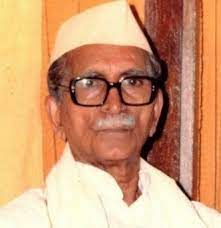Gogineni Ranga Nayakulu, also known as NG Ranga, was a distinguished politician and freedom fighter. He was a champion of Peasant rights and is considered the father of the peasant movement in India. In 1991, he was awarded with the Padma Vibhushan award.
NG Ranga was born on November 7, 1990, in Nidabrolu Village of Guntur District, Andhra Pradesh. His parents, Nagaih and Atchamamba, were farmers. He completed his primary and secondary education in Nidabrolu. He matriculated and graduated from Andhra Christian College, Guntur.
In 1920, Ranga left for England and studied Economics and Political Science at Oxford University. He received a doctorate for his research on “The Economics of Handlooms” from the Oxford University. He completed his higher studies and returned to India by 1926. At Oxford, Ranga studied the works of influential political thinkers such as Bertrand Russel, HG Wells and JS Mill. He was attracted to socialist philosophy after witnessing the progress of the USSR. However, his belief in socialism was short-lived, as the Stalin regime’s oppression of peasants and the initiation of Soviet land reforms such as forced collectivisation led to Ranga’s departure from Marxist ideology.
Commenting on the forced collectivisation, Ranga remarked, “Peasants were faced with the awful prospect of having to slave hard on their holdings and produce bumper crops, only to hand them over, at the preemptory behests of the Soviet armed proletariat, to the soviet authorities without any hope of receiving any of their most elementary necessaries.”
Since NG Ranga belonged to a farming family, he understood the problems of farmers well. He was determined to contribute to eradicating these problems. It is also worth noting that during his schooling, NG Ranga began reading reformist literature. He was inspired by Kandukuri Veeresalingam, a social reformer and liberal thinker of his time.
Ranga said, “The most important all-India leader who made the biggest impact on my mind and activity before I left for studies at Oxford in 1920 was Veeresalingam. His books lifted me out of my rural moorings and placed me in the ever-expanding stream of national feelings, thoughts and movements.”
After returning to India, Ranga worked at Pachayappa College in Madras as an Economics lecturer. Soon after, he was duly appointed by the Justice party as ‘Adviser of the Madras state government on economic affairs’.
In 1930, Ranga’s career took a political turn. He resigned as a lecturer and state advisor. He joined the Indian National Congress the same year and became part of the Indian freedom movement. Ranga looked up to the charismatic personality of Gandhi. He wrote a book titled “Bapu Blesses”, in which he wrote about his discussions with Gandhi on various topics.
Rajagopalachari wrote the introduction in Bapu blesses, “Whether we follow Mahatma Gandhi’s advice on various matters or not, it is an undeniable fact that our people in India consider him the wisest of men our country produced. NG. Ranga is one of our exceptional men, whose whole concern is the happiness of our people and not one’s own advantage”.
NG Ranga had a progressive vision of educating the peasant population. He believed that peasants would understand the government policies affecting them through education. In 1934, Ranga launched the Indian Peasant Institute in Guntur, Andhra Pradesh. He insisted on using orthodox Telugu knowledge-sharing methods. These included using Burrakatha(oral storytelling), Veera Katha(storytelling on brave acts/people) and Mono acting.
In 1954, following his defeat as the President of the Congress party of Andhra Pradesh, Ranga resigned from the party. On his resignation, he wrote, “I have differed violently from Jawaharlal over the fate of self-employed masses of India and parted political company with him.”
By the mid-1950s, a growing sense of discontent was prevalent in the country regarding the ruling Congress party. Nehru’s socialist orientation led to enacting policies encompassing central planning, land redistribution and state control over key industries.
C Rajagopalachari, also known as Rajaji, founded the Swatantra party in 1959. The Swatantra party was founded on the principles of classical liberalism and economic freedom. Rajaji invited NG Ranga to take up the position of President of Swatantra party. Ranga joined the Swatantra party and served as the President for a decade. From 1959 to 1969, under the leadership of Rajaji and NG Ranga, the Swatantra party rose to a position to challenge the Congress government. With the support of traders, businessmen and industrialists, the party tasted electoral success in the 1962 elections by securing 25 Lok Sabha seats and 207 State assembly seats.
Ranga vehemently criticised the Congress Party over the 17th Constitutional Amendment, which allowed the state governments to acquire lands of farmers without paying due compensation. Ranga advocated for minimal state intervention and liberty to hold private property. Due to the continuous efforts by Ranga and other party leaders like Minoo Masani, Rajaji and Dayabhai Patel, the party became the single-largest opposition in Lok Sabha by winning 44 seats in the 1967 elections.
However, by 1969, the political landscape of India witnessed several changes. The Congress underwent a split into two factions led by Indira Gandhi and K Kamraj. Minoo Masani opposed the proposal of a joint alliance between the Kamraj faction and the Swatantra party. NG Ranga and Minoo Masani were not on the same page on several issues. In fact, NG Ranga wrote that the party members had grown impatient over Masani. In his book Distinguished Acquaintances, Ranga wrote, “Though he was admired, he did not succeed in winning the affection and willing confidence of the majority within our growing -though small- parliamentary group. .. Once he became the President of the party, as a whole, his irrepressible love of exercising his powers and his inability to await the development of consensus came to force”.
NG Ranga returned to the Congress party following Swatantra party’s defeat in the 1971 elections. He continued to serve in the Parliament from 1977 to 1991. Throughout his political career, Ranga stood for peasants, the right to property and economic freedom. In his memory and honour, the Agricultural University of Andhra Pradesh is named Acharya NG Ranga Agricultural University.
References
Bapu blesses, by N. G. Ranga, 1969, The Indian Peasant Institute publication
Distinguished Acquaintances, Volume 1&II, by N. G. Ranga. Desi Book Distributors, 1976.
https://amritmahotsav.nic.in/district-reopsitory-detail.htm?12998
https://indianliberals.in/periodicals/swatantra-party/
https://www.constitutionofindia.net/members/n-g-ranga-rao/
https://www.peepultree.world/livehistoryindia/story/eras/c-rajagopalachari
N G Ranga: Swatantra’s Peasant Leader – Spontaneous Order
N.G Ranga and the Peasant Movement | INDIAN CULTURE


